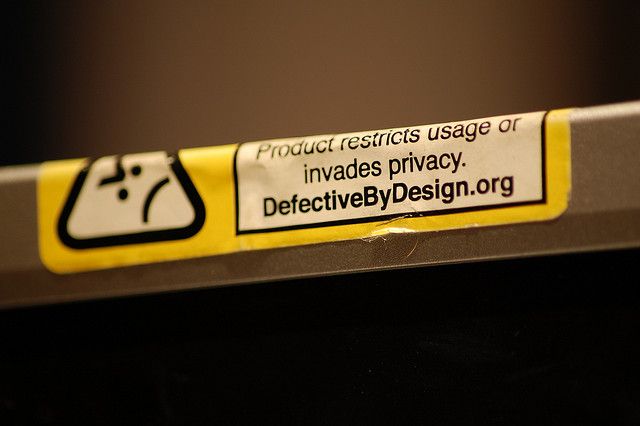Like clockwork, along with Apple’s new product announcements came a protest against them. The Free Software Foundation’s anti-DRM campaign took a timely if predictable potshot against the Apple Watch and Apple Pay after the products were unveiled Tuesday.
“It is astonishing to see so much of the technology press acting as Apple’s marketing arm,” said FSF executive director John Sullivan in a statement Tuesday after Cupertino’s big Apple Watch reveal. “What’s on display today is widespread complicity in hiding the most newsworthy aspect of the announcement — Apple’s continuing war on individual computer user freedom, and by extension, free speech, free commerce, free association, privacy, and technological innovation.”
He’s got a point. Thanks to integrated health trackers, smart payment systems and seamless messaging across devices, the new Apple gadgets will be capable of knowing seemingly every breath you take, every move you make — and every craft beer you buy at Whole Foods (along with sending your heartbeat to a friend or an ex after you’ve drunk two or three or seven pints).
For the privacy paranoid, the corporate “tracker” we carry around every day just got put on steroids.
Full disclosure: I’m probably more sympathetic to the Free Software Foundation’s cause than most Apple journalists and probably some tech journos, too. My husband once worked for the FSF; I’ve been conscripted as a volunteer on occasion and have infiltrated more FLOSS-y meetups, powwows and hackathons than I care to recall.
That said, I’m a pragmatist, not a true believer. I’ll cop to being more privacy-conscious than average — maybe just one Faraday bag away from complete paranoia. But my moves are limited to using tracker-free search engine DuckDuckGo, tracker blocker Ghostery, occasionally turning my iPhone off on weekends, and making sure that the apps I use aren’t sucking up personal data they don’t need.
While the Free Software Foundation’s campaign has always been a David and Goliath battle, it has been fought with a lot more aplomb than this. You might remember the FSF’s long-running campaign against DRM, Defective by Design. It was ahead of its time, with sexy-sado protest posters of the iPod silhouette ads binding a woman back in 2006. The image was catchy and sparked conversation.
Since then, though, the group’s been pounding the same drums with nothing that could go viral. Basically, I don’t see how I can get my mom — or many of my friends, who don’t get why they should even care about data brokers or the National Security Agency — interested in these issues.

I asked FSF campaign manager Zak Rogoff what the alternatives were — what cellphone can you buy that won’t track your every move?
His answer was depressing: The FSF is still pushing something called Replicant, a free software fork of Android. When I asked what functionalities are compromised (GPS? the compass?) he sent over a link to a Replicant wiki.
The fact that Replicant phones must follow the strictures of the Four Freedoms further hamstrings the initiative, which is funded by the FSF. “Depending on the device, more or less of the hardware currently works. Basically, it will only work if it can do so with 100 percent free software,” Rogoff admits.
So you’re fighting Apple’s beautiful design and corporate showmanship with a short list of Replicant-compatible Android phones and a wiki, basically.
Good luck.


